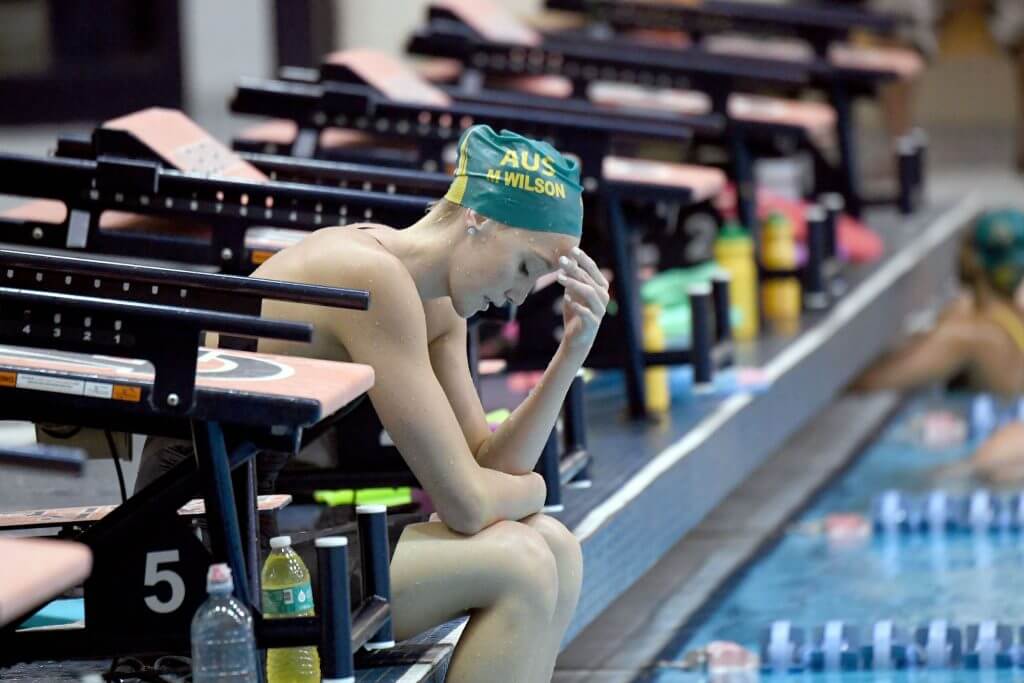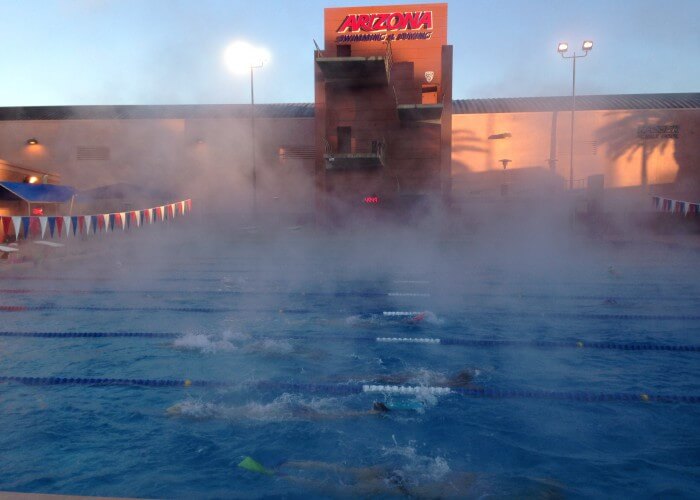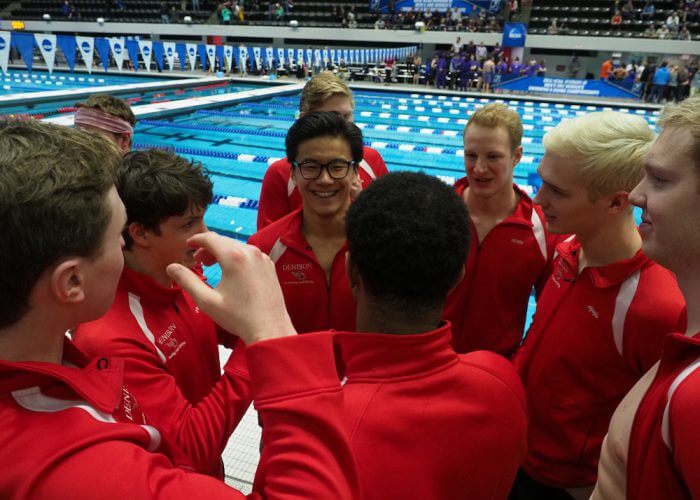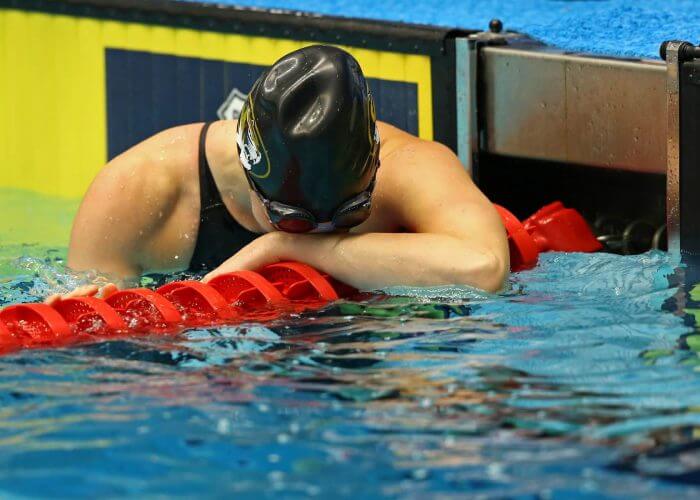5 Difficult Decisions Swimmers Will Be Expected to Make

Decisions, Decisions!
By Jennifer Yoo, Swimming World College Intern.
Life is full of difficult decisions. There is an inexplicable pressure to make the right one, and each decision determines a different outcome that ultimately leads to even more choices. However, whether the choice was right or wrong, the decisions that we make help to shape us into the person we are today.
Both in their personal and athletic lives, swimmers are constantly faced with tough choices common to the collegiate swimming experience. The decisions that they make reflect their discipline and dedication to the sport. Every choice, no matter how small, determines the kind of swimmer that they are. Here are five common issues that competitive swimmers face and must choose what is best for themselves.
1. Extra/Morning Practices

Photo Courtesy: Annie Grevers
Every swim team has a combination of afternoon and morning practices throughout the week. While coaches usually only require swimmers to attend a certain amount of practices each week, some swimmers take it upon themselves to attend more. Any swimmer can show up to afternoon practice, but it takes a dedicated swimmer to wake up and go to morning practices at 5 a.m.
To sleep or not to sleep: that is the question that every swimmer faces. Swim schedules are rigorous, so it comes as no surprise that swimmers love their sleep and get it whenever they can. Sleeping becomes a sacred ritual, so being woken up by a blaring alarm at 4 o’clock in the morning can make a veteran swimmer cry. In that dazed moment, a swimmer comes to a difficult decision: turn off the alarm and go back to sleep or jump into freezing pool waters.
2. Nutrition
With the amount of calories that swimmers burn at each practice, they have gained the reputation of being able to eat a colossal amount of food. It’s easy to eat anything you want because it will be worked off at practice. While some swimmers disregard healthy food, nutrition is an essential part of being a successful swimmer. Eating healthy is not easy for anyone, but it can determine how you perform at practice and meets.
3. Intervals
At every practice, there are separate intervals for different sets. Sometimes, coaches will nudge a swimmer to do a certain interval because they know they are capable of achieving faster times. However, for the most part, coaches allow their swimmers to pick an interval that they believe they can make. This presents swimmers with a difficult decision, because they are left to gauge their abilities for the set that is written. Some intervals are comfortable to do at the beginning then turn into touch-and-go, while others are too easy. It is up to the swimmer to know the perfect middle ground that pushes them but does not break them. Fear often holds swimmers back from pushing to the next level.
4. Gossip

Photo Courtesy: Denison Athletics communications
The extensive amount of time spent with the same small number of people can lead to drama within a team. Due to its prevalence in swim team culture, drama can be inescapable. It’s easy to become sucked into the swirl of gossip and let it consume you, complicating relationships and creating more hardship. As a result, some swimmers may decide to turn the other way when they hear about the latest news on the team. Would you rather become distracted and pulled down by negativity or stay focused and pull the team forward?
5. When to Walk Away

Photo Courtesy: Aaron Doster-USA TODAY Sports
There are various reasons that lead swimmers to leave the sport for good. It could be due to injury, not wanting to continue at a collegiate level, or they have realized their passion for something else. Whatever the reason, it is never an easy decision to make. It can be the hardest dilemma of their swimming careers, because leaving means saying farewell to their swim family and hard work.
However, some swimmers decide to stay. Some even become coaches. They come full circle, and now it becomes their job to teach the new swimmers the tricks and trades of swimming. They use their wisdom and experience to help guide the future of swimming.
-All commentaries are the opinion of the author and do not necessarily reflect the views of Swimming World Magazine nor its staff.




Going back to swimming with U.S. Masters Swimming was one of the best decisions I have made. Only regret is how long I waited but nothing like being back!
Brent Fletcher hard to throw away so many hours and years
Brent Fletcher Same. 20 year break for me. Loving every second of it. Actually makes me love watching the “kids” (the Pro’s) even more!
Liz Hudson Awesome! Yes its amazing how much I appreciate all of it now too. Great job on getting back too!!
Evan Chew
Mornings n afternoons ……
Choosing between swimming and ballet!!! But in the end I took the best decision ever by becoming solely a swimmer!
Plus both can be practiced also later in life
I just had to make this decision too! I love dancing and swimming, but once I got older I didn’t have time to do both, but I chose swimming!
Never EVER had a coach let me choose my interval.
Got back in the water with a Masters team it’s been 35 plus years. Now doing doubles and loving it, l keep asking the coaches to push me
I was thinking that too! ?
Right Kathryn?! Or had a choice on coming to morning practices. I swam in a dictatorship not a democracy!
Mornings like the one featured, with the steam coming off the pool….even better – as the sun is just starting to lighten the sky ? It doesn’t get any better.
Calli Edens
Great article, except I don’t like the word “quit”. A better word for this decision is “retire”. Swimmers simply aren’t quitters.
I am currently swimming at the National Senior Games right now & I love it at 50 years old!
Choosing between a being a swimmer and the courier you’ve been studying for when the work hours overlap into training timeí ½í¸
Haley Johnson
I’ll never forget the day I made the decision to quit. After surgery and rehab I was back in the pool. Right in the middle of a set, in pain and that was it. Worst decision of my life not to push through the pain.
Patrick Cummins my daughter had two stress fractures in her back, two bulging disc and a slipped disc. And she did her Physio and dug deep. She could have easily given up. After seeing you post your regrets I’m so glad she stuck with it. Maybe you should start up again just for the love of it.
Optional morning workouts in college? No choice or chance. Probably for the better. I definitely would have hit the snooze many days… ugh.
Billy… I walked on my college team and had to quit due to keeping a job to support myself. The work outs were intense but it was cool to be in the pool at 6am ,out doors in January , in South Florida. It is one sport you can do for the rest of your lifetime.
I have never heard that coach gives choice of intervals. At least not in competitive swimming
Stella
Yep ?
Julie yep all tricky ones
Just want to get back in the pool now!
I have seen a huge difference in how coaching has evolved and not for the better in my opinion. Children need to be children and to monopolize all of their free time with 9 practices a week when they’re 12 13 14 years old it’s asinine. I hear these kids, they are so angry. When they don’t think we’re listening I hear… I’m going to quit, I’m done, I’ve had it, I just want to go out with my friends. I’ve seen swimmers that have just amazed me that have blown up and walked away that could have been the next Michael Phelps… It’s too much just way too much.
So true
It’s a terrible terrible situation. Lots of anxiety, regret and sadness happening in club swimming. Massive damage being done to kids for no reason
Kelly Dobson familiar ❤️
Glad to hear some of you are coming back by joining USMS. We welcome all of you. USMS helped College Club Swimming become a real organization, and there is now a direct path from CCS to USMS with various incentives offered to CCS members to join USMS. CCS swimmers tend not to get burned out the way varsity swimmers do, so continuing to swim and compete is not as difficult for them. When I graduated from college in 1965 there was no USMS. It got started in 1970, and I joined in 1972 and have been competing ever since, in well over 200 meets now. USMS, like CCS, is as much a social as an athletic experience. We do get excellent coaching, but most of us are doing 3,000 yards in practice, which is about what I did when in college–not the insane 10,000+ yards that became the norm later for college swimmers. There are some Olympians who continue to compete in USMS meets like Matt Grevers and Anthony Ervin. Jeff Farrell, once the world’s fastest freestyler, is still going strong in the 80-84 age group. And, believe it or not, we have swimmers in the 100-104 age group still competing.
So inspirational! I’ve been swimming in the ocean this summer… tried a wet suit for the first time…you are enouraging me to try Masters at age 66…clearly the best sport on the planet! Any suggestions on controlling arthritis in the shoulder? There is something magical about being in the water…
Alex lynn
Best thing about being a competitive swimmer is that you learn to kick BUTT…….erfly.
I just swapped the swimming and gym for work. Now apparently I’m a workaholic. Ooo yeah and I kept eating and got fat.
Hi
I will never leave swimming